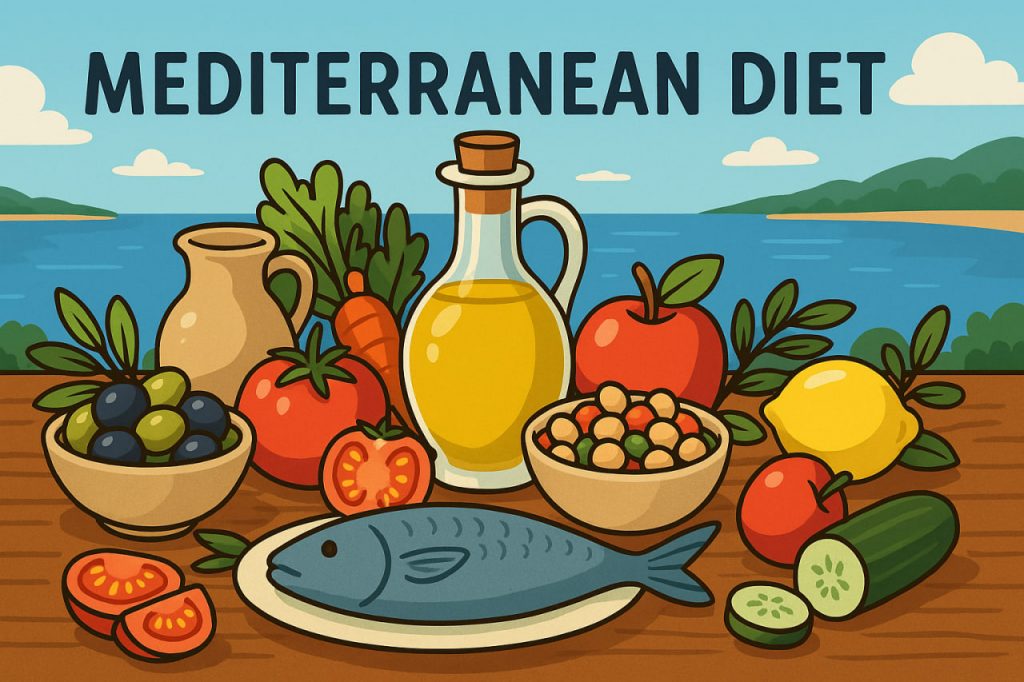The Mediterranean diet is more than just a way of eating—it’s a lifestyle rooted in the traditional dietary habits of countries bordering the Mediterranean Sea, such as Greece, Italy, and Spain. Recognized worldwide for its positive effects on heart health, longevity, and disease prevention, this diet emphasizes whole, fresh, and nutrient-dense foods.
What Is the Mediterranean Diet?
Unlike rigid weight-loss plans, the Mediterranean diet is flexible and balanced. It encourages:
- Fruits and vegetables as the foundation of daily meals
- Whole grains, such as brown rice, oats, and barley
- Healthy fats, especially extra virgin olive oil and nuts
- Legumes, including lentils, chickpeas, and beans
- Lean proteins, particularly fish and seafood
- Herbs and spices instead of salt
- Moderate dairy, mainly yogurt and cheese
- Limited red meat and processed foods
It’s more about eating patterns than restrictions, promoting mindful eating, family meals, and physical activity as key elements.
Proven Health Benefits
- Heart Health
The Mediterranean diet is linked to lower blood pressure, reduced cholesterol levels, and decreased risk of heart attack and stroke. - Weight Management
The diet helps control weight naturally due to its focus on satiating, whole foods with balanced macronutrients. - Lower Risk of Type 2 Diabetes
It stabilizes blood sugar levels and improves insulin sensitivity. - Brain Protection
Studies show a reduced risk of cognitive decline and Alzheimer’s disease in long-term followers. - Anti-Inflammatory Effects
Rich in antioxidants and omega-3s, the diet helps combat chronic inflammation—a root of many diseases.
A Sample Daily Meal Plan
Breakfast:
Greek yogurt with berries, walnuts, and a drizzle of honey
Lunch:
Chickpea and vegetable salad with olive oil and lemon dressing, whole-grain pita bread
Snack:
Sliced cucumber, olives, and a handful of almonds
Dinner:
Grilled salmon with quinoa and steamed greens, plus a glass of herbal tea
Dessert:
Fresh fruit or a few squares of dark chocolate
Simple Tips to Start
- Switch butter for olive oil
- Eat fish twice a week
- Replace red meat with legumes or chicken
- Choose whole grain bread and pasta
- Add fresh herbs to your meals
- Snack on nuts, seeds, and fruit
Not Just a Diet—A Lifestyle
The Mediterranean way of living also emphasizes:
- Physical activity, such as walking or gardening
- Social meals with friends and family
- Appreciation for food and portion awareness
It promotes health not through strict rules but through sustainable habits and a positive relationship with food.
Conclusion
The Mediterranean diet is consistently ranked among the healthiest diets in the world. It’s flavorful, adaptable, and backed by decades of scientific research. Whether your goal is to improve heart health, prevent disease, or simply eat more naturally, the Mediterranean diet offers a delicious and nourishing path.
Glossary
- Antioxidants: Compounds that protect cells from damage by free radicals.
- Omega-3 Fatty Acids: Healthy fats found in fish that reduce inflammation and support brain and heart health.
- Insulin Sensitivity: How effectively the body uses insulin to manage blood sugar.
- Whole Grains: Grains that contain all parts of the seed, offering more nutrients than refined grains.


